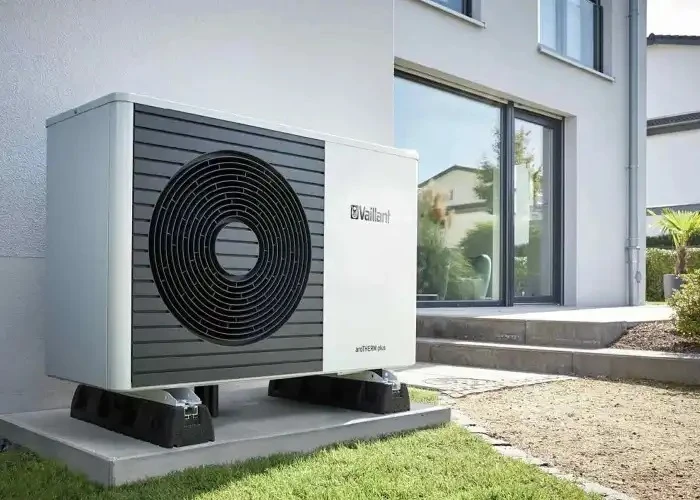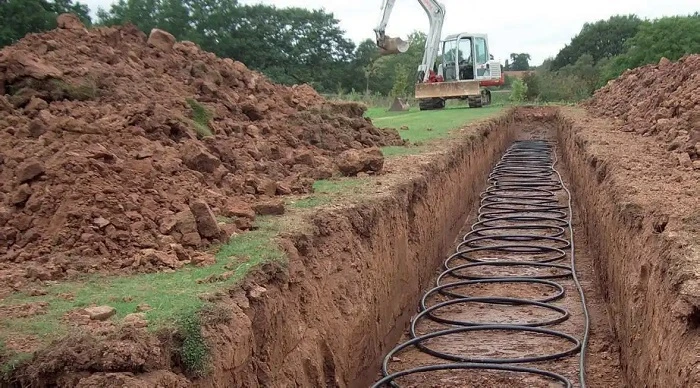Air Source Vs. Ground Source Heat Pumps
Heat Pumps
Published date: 26 July 2024 / Read time: 8 mins
With many more of us looking to go green, the number of homeowners turning to air pumps has risen steadily. From air source to ground source heat pumps, renewable heating solutions are worth considering as long-term solutions when creating more climate-friendly homes.
Yet, though heat pumps are fantastic ways to create more energy-efficient homes while reducing emissions, choosing between an air source heat pump and a ground source heat pump will all depend on the type of property you live in.
Here, our energy and renewables team at City Plumbing helps you select an air or ground source heat pump, based on your current home type.

Heat Pumps Efficiency
The temperature where your home is located will play a crucial factor in your heat pump's efficiency. So, for example, those living in colder climates will find their heat pump requires more energy to heat the home.
Typically, air source heat pumps work with temperature ranges between -5°C and 25°C. Ground source heat pumps however make use of the soil temperature, and this consistently stays above 5°C.
So, though each heat pump will be more efficient during a different season, it’s ground source heat pumps that are more efficient over a year. Yet, when considering installation prices, it’s air source heat pumps that are deemed the more cost-effective.
Heat Pumps Cost
There are a range of factors to consider when purchasing a heat pump, which all differ based on household type, including:
- House size
- Potential preparation work required
- Upgrades to current underfloor heating or radiators suggested by installers for boosting energy-efficient
- The Type of heating solution required (air source heat pumps are cheaper to install than ground source heat pumps)
Note: air source heat pumps are indeed the cheaper option when compared to ground source heat pumps, many homeowners would argue the additional cost when choosing ground source is worth it. When heating the home, a ground source is a more efficient choice, thus helping you save money on bills long-term.
Heat Pump Installation Requirements
For many homeowners the requirements demanded when installing air source and ground source heat pumps will play a large factor in deciding which type to choose.
Understandably, air source heat pumps are the easier and quicker install choices aa unlike ground source heat pumps, land doesn’t have to be dug up to accommodate them. Air source heat pumps are placed similarly to air condition units on the side of the home.
Ground source heat pumps will require an assessment of the land to determine if it can accommodate a grand loop that’s big enough to provide power to the home. Properties with reduced room outside may still be able to opt for ground source via the use of boreholes that allow the ground pipe to be installed vertically. Yet, this will add to the costs of installation.
For those homeowners with ample space, ground source heat pumps may work well. Yet, for ease of installation and indeed reduced costs at this stage, air source beats ground source here.
Heat Pump Planning Requirements
As air source heat pumps generally fall under the label of permitted development, they don’t usually require any planning permission. On the other hand, ground source heat pumps will require planning permission due to the type of labour involved. Installing a ground source heat pump requires digging up the land around your property and thus can take several weeks to complete.
Though obtaining planning permission for ground source heat pump work isn’t always that difficult for most homeowners, understandably this action is eliminated when choosing an air source heat pump.

Heat Pump Lifespan
On average, ground source heat pumps have a longer lifespan when compared to air source heat pumps.
Ground source heat pumps average around 20 years and require little maintenance because of their underground position and being protected from environmental damage.
Air source heat pumps have an average lifespan of around 10 years and this in part is due to their continual exposure to the elements.
So, while air source heat pumps are the quicker and cheaper of heat pumps upon installation, they will need replacing a lot earlier than ground source heat pumps.
Heat Pump Emissions
Finally, as heat pumps in general make a home more energy-efficient, whichever system you choose to install will help lower your carbon emissions.
Ultimately, ground source heat pumps remain the more efficient of the two and these have the lower carbon footprints. Yet, when compared to traditional heating systems both an air source heat pump and a ground score heat pump will promote lower emissions overall.
Shop Heat Pumps with City Plumbing
Overall, both air source and ground source heat pumps offer various advantages and disadvantages. By weighing the pros and cons of each type of heat pump and considering your specific needs, you can make an informed decision on which option is best suited for your property.
If you're looking to make the change, contact our Renewables Team at City Plumbing. Experts in the latest energy-efficient technologies, we're perfectly placed to help homes and businesses make the smooth transition to renewable technology.




